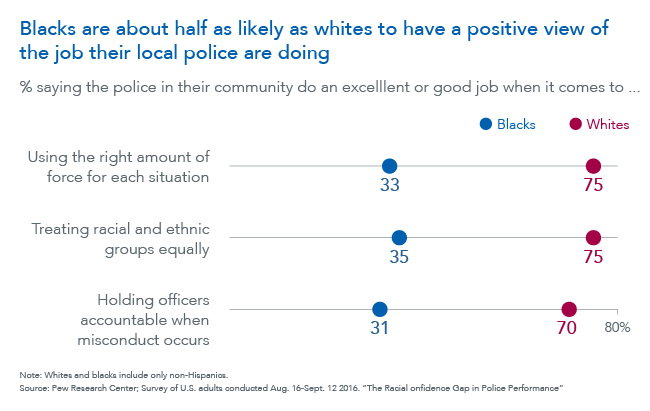|
Judging by the headlines, blogs, videos and posts we've all seen over the past couple of years, it would be easy to conclude that police-community relations are suffering greatly. Surely, the traditional bond between officers and citizens - immortalized in the 1958 Norman Rockwell painting The Runaway - is now relegated to the dustbin of history.
In October 2016 Gallup released the results of a poll featuring the question, "How much respect do you have for the police in your area - a great deal, some or hardly any?" The result? More than three-quarters - 76% - responded that they have a great deal of respect for local officers. That figure approaches a 50-year high (it was 77% in 1968) and marks a significant uptick (12 points) from 2015.1
So, everything is good then? Not exactly.
While that same Gallup poll showed an uptick from 2015 to 2016 in the "great deal of respect" category for both whites and non-whites, a noticeable gap exists (80% of whites responded this way; 67% of non-whites). Furthermore, a Pew Research poll conducted last August revealed a chasm between whites and blacks when it came to views of police performance in such areas as use of force, equal treatment of racial and ethnic groups and officer accountability.2

It seems, then, that closing the gap in perception of law enforcement personnel between white and non-white citizens might well begin with building, or rebuilding, trust. Police and citizens share the responsibility of building and fostering trust. For law enforcement agencies, the U.S Department of Justice offers suggestions:3
5 Ways to Build Trust Between Police and Community
1. Acknowledge and discuss with your communities the challenges you are facing. That includes not only recent issues that may have damaged relationships with the community, but historic failings as well. In acknowledgement of the nation's history, the Police Executive Research Forum has opined, “While it is true that many police officers were not even born then and thus cannot be responsible for enforcing Jim Crow laws, all police should be aware of this history and be responsible to it, meaning that police must understand that this history is legitimately part of some people's feelings about the police."
2. Be transparent and accountable. Making policing policies and procedures available for public review, including posting to the department's website, is a good start. So is releasing as much information as possible post-incident, and correcting any misinformation or changing information as investigation into the incident develops.
3. Take steps to reduce bias and improve cultural competency. The President's Task force on 21st Century Policing recommended in-service training on implicit bias and cultural responsiveness. Effective officers communicate with and understand the diverse communities they serve.
4. Maintain focus on the importance of collaboration, and be visible in the community. Interactions between officers and community residents in non-enforcement situations are important. Police involvement in community events, sports leagues, etc. can help.
5. Promote internal diversity and ensure professional growth opportunities. Recruiting and promotional practices that are transparent, encourage diversity, and present policing as the profession it is…along with encouragement of continuing professional development and higher education…all create an environment of fairness and respect for officers. As a result, "officers are more likely to demonstrate these qualities in their daily interactions with the community."
Source: U.S. Department of Justice
It may be true that for police and citizens the days envisioned by Norman Rockwell are long gone. But hopefully, not the shared fundamental qualities of compassion, understanding and trust so important in building strong relationships between police and the communities they serve. _______________________________________________________
Endnotes
1. Gallup poll conducted October 5-9, 2016.
2. Pew Research Center, survey conducted August 16- September 12, 2016. "The Racial Confidence Gap in Performance."
3. U.S Department of Justice. Community Relations Services for Policing.
https://www.justice.gov/crs/file/836486/download
The material contained in this publication has been prepared solely for informational purposes
by Genesis Management and Insurance Services Corporation.
|